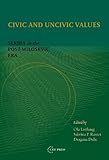Civic and Uncivic Values : Serbia in the Post-Milošević Era / ed. by Ola Listhaug, Dragana Dulic, Sabrina P. Ramet.
Material type: TextPublisher: Budapest ; New York : Central European University Press, [2022]Copyright date: ©2011Description: 1 online resource (468 p.)Content type:
TextPublisher: Budapest ; New York : Central European University Press, [2022]Copyright date: ©2011Description: 1 online resource (468 p.)Content type: - 9789639776999
- 305.8009497109051 22
- online - DeGruyter
| Item type | Current library | Call number | URL | Status | Notes | Barcode | |
|---|---|---|---|---|---|---|---|
 eBook
eBook
|
Biblioteca "Angelicum" Pont. Univ. S.Tommaso d'Aquino Nuvola online | online - DeGruyter (Browse shelf(Opens below)) | Online access | Not for loan (Accesso limitato) | Accesso per gli utenti autorizzati / Access for authorized users | (dgr)9789639776999 |
Frontmatter -- Table of Contents -- Preface -- Part One – Introduction -- 1. Serbia’s Corrupt Path to the Rule of Law: An Introduction -- 2. Serbia after Milošević: The Rebirth of a Nation -- Part Two – Political and Social Values -- 3. Serbian Civic Values in a European Context -- 4. The EU in the Values and Expectations of Serbia: Challenges, Opportunities, and Confrontations -- 5. Orthodox Values and Modern Necessities: Serbian Orthodox Clergy and Laypeople on Democracy, Human Rights, Transition, and Globalization -- 6. The Social Values of Serbian Youth -- Part Three – Media and Films -- 7. The Post-2000 Media Situation in Serbia -- 8. We All Live Two Lives: Serbian Cinema & Changing Values in Post Yugoslavia -- Part Four – Schools, Gender, and Nationalism -- 9. Value Changes in the Interpretations of History in Serbia -- 10. Nationalism as a Religion: Examples from Contemporary Serbia -- 11. Engendering Transitional Justice: Political Responsibility in Serbia -- Part Five – Kosovo as Myth and as Politics -- 12. Dead Kings and National Myths: Why Myths of Founding and Martyrdom Are Important -- 13. Discursive Practices and Semiotic Representations: Serbian Rhetoric about Montenegro and Kosovo -- 14. Kosovo in Serbian Politics since Milošević -- 15. Inter-ethnic Dialogue between Serbs and Albanians in Serbia/Kosovo, 1996–2008 -- Part Six – Conclusion -- 16. The Power of Values (A conclusion) -- List of Contributors -- Index of Names -- Subject Index
restricted access online access with authorization star
http://purl.org/coar/access_right/c_16ec
Discusses Serbia’s struggle for democratic values after the fall of the Milošević regime provoked by the NATO war, and after the trauma caused by the secession of Kosovo. Are the value systems of the post-Milošević era true stumbling blocks of a delayed transition of this country? Seventeen contributors from Norway, Serbia, Italy, Germany, Poland and some other European countries covered a broad range of topics in order to provide answers to this question. The subjects of their investigations were national myths and symbols, history textbooks, media, film, religion, inter-ethnic dialogue, transitional justice, political party agendas and other related themes. The authors of the essays represent different scholarly disciplines whose theoretical conceptions and frameworks are employed in order to analyze two alternative value systems in Serbia: liberal, cosmopolitan and civic on the one hand, and traditional, provincial, nationalist on the other.
Mode of access: Internet via World Wide Web.
In English.
Description based on online resource; title from PDF title page (publisher's Web site, viewed 30. Aug 2022)


